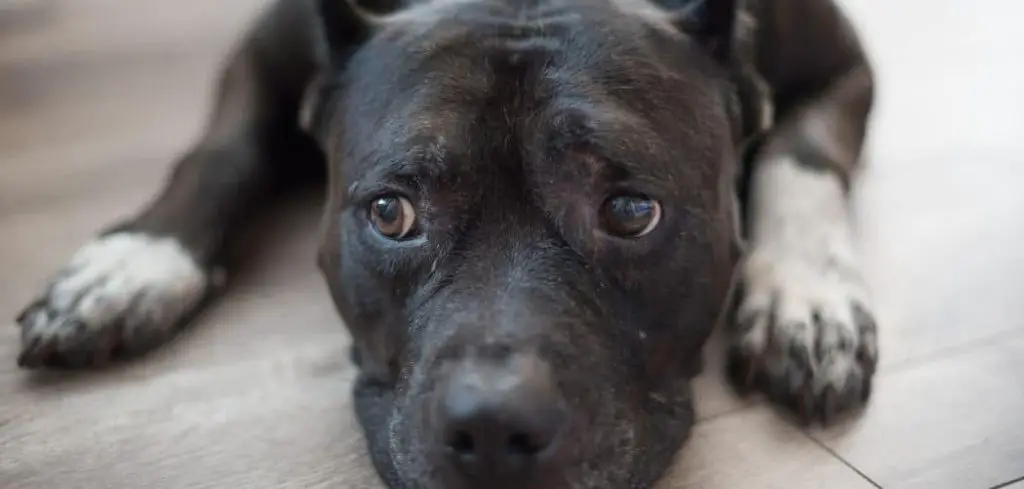Seeing your dog pooping blood and vomiting can be alarming. These symptoms often signal that something is seriously wrong, ranging from minor digestive irritation to life-threatening illness.
We outline the common reasons your dog is pooping blood and vomiting, what you can do at home, and when to seek veterinary help.
Dog Pooping Blood and Vomiting — Why It Happens
When a dog is both pooping blood and vomiting, it usually means the digestive system is under significant distress. This can be due to infections like parvovirus, gastrointestinal blockages, parasites, ulcers, or poisoning.
Trauma to the digestive tract, severe inflammation, or underlying conditions such as pancreatitis can also lead to these symptoms.
Because blood loss and vomiting together can quickly lead to dehydration and shock, this combination of signs should always be taken seriously.

Dog Pooping Blood and Vomiting: Common Causes
Parvovirus
Parvovirus is one of the most dangerous causes of blood in the stool combined with vomiting.
This viral infection damages the lining of the intestines, leading to severe bleeding, foul-smelling diarrhea, and relentless vomiting.
Dogs with parvo quickly become dehydrated and weak. Puppies and unvaccinated dogs are at highest risk. Without urgent veterinary treatment, this condition is often fatal.
Read more: Dog Pooping Blood and Throwing Up Foam (Here’s Why)
Gastrointestinal Blockage
If your dog has swallowed a toy, bone, sock, or another foreign object, it may become lodged in the intestines. This blockage prevents food and fluids from passing through, causing vomiting.
As the obstruction irritates the intestines, blood can appear in the stool.
Dogs may show signs like abdominal pain, repeated retching, drooling, and refusing food. Surgery is often needed to remove the object.
Parasites
Intestinal parasites like hookworms, whipworms, and giardia can cause both bloody stool and vomiting.
Heavy infestations damage the intestinal lining, leading to bleeding and digestive upset.
Dogs with parasites often lose weight, develop a dull coat, and seem less energetic. Puppies are especially vulnerable because parasites steal vital nutrients during growth.
Gastric Ulcers
Stomach ulcers can form due to stress, certain medications (like NSAIDs or steroids), or underlying illness.
When ulcers erode the stomach lining, blood is released into the digestive tract, which may appear as blood in the stool.
Vomiting often accompanies ulcers, and in severe cases, dogs may vomit material resembling coffee grounds (partially digested blood). Left untreated, ulcers can worsen and lead to dangerous internal bleeding.
Poisoning
If your dog has ingested a toxin—such as rat poison, toxic plants, or human medications—it can damage the stomach and intestines. This leads to vomiting, bloody diarrhea, drooling, and lethargy.
Some poisons also interfere with blood clotting, making even minor bleeding more severe. Poison ingestion is a veterinary emergency that requires immediate treatment.
Pancreatitis
Pancreatitis occurs when the pancreas becomes inflamed, often after a fatty meal or dietary indiscretion.
This condition disrupts digestion and can cause vomiting, diarrhea (sometimes bloody), and severe abdominal pain.
Dogs with pancreatitis often hunch their backs in discomfort and refuse to eat. Severe cases can lead to dehydration, organ damage, and even death if not treated quickly.
What to Do If Your Dog Is Pooping Blood and Vomiting
If your dog shows these symptoms, the first step is to keep them comfortable and prevent further stress.
Withhold food for several hours to allow the stomach and intestines to settle. Offer small sips of water or ice cubes to help with hydration.
If your dog seems stable and the symptoms are mild, you can try feeding a bland diet of boiled chicken and plain rice once vomiting has stopped.
However, do not delay veterinary care if the signs persist or worsen.
Avoid giving over-the-counter human medications, as many can worsen the condition or be toxic to dogs.
Monitor your dog’s stool and vomit for changes, and note their energy level, appetite, and hydration status.
When to Call or Visit Your Vet
You should seek veterinary help immediately if:
Your dog is a puppy, elderly, or unvaccinated.
Vomiting and bloody diarrhea happen multiple times in a short period.
Your dog is weak, lethargic, or collapsing.
Vomit or stool contains large amounts of blood.
Signs of poisoning are suspected (rat poison, medications, toxins).
Even if symptoms seem mild, bloody stool combined with vomiting is not something to ignore. A vet can perform tests to identify the underlying cause and provide fluids, medications, or surgery if needed.
Read more: Dog Pooping Blood, Vomiting and Not Eating (Here’s Why)
Key Takeaway
Dog pooping blood and vomiting is always concerning and often signals a serious medical problem. While some causes may be minor, others—such as parvovirus, poisoning, or blockages—require urgent treatment.
Keep your dog hydrated, monitor their condition closely, and contact your veterinarian right away if symptoms are severe or persistent.
Quick action can make all the difference in protecting your dog’s health and recovery.
